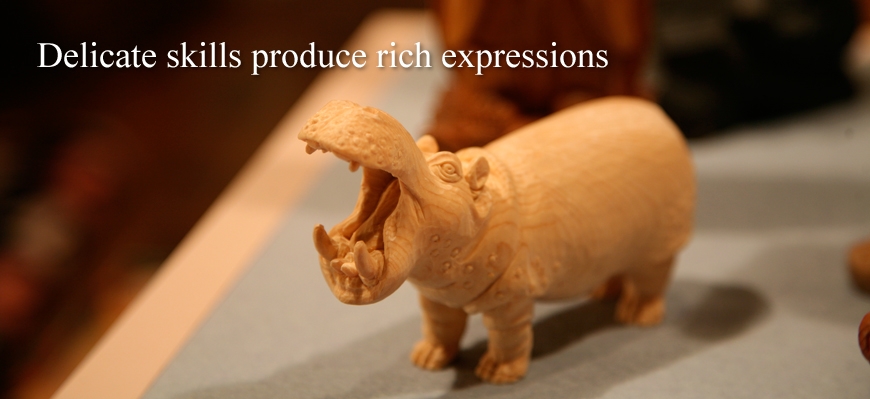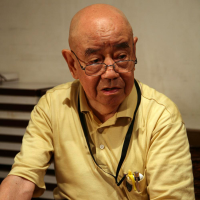
Kotaro Okawa
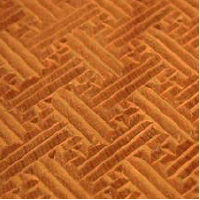
Carved Wooden Board with Traditional Pattern
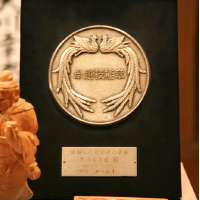
Okawa learned carving from Koun Takamura
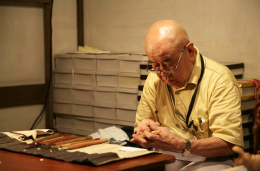
I make anything that can be carved from wood
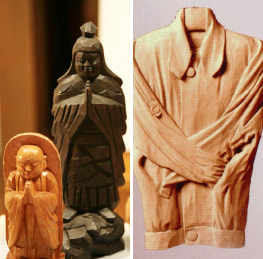
I once carved briefs and brassiere, which were displayed in an exhibition. I was asked to show something different other than Buddhist statues. Since I carved sculptures other than traditional Buddhist statues, those sculptures temporarily gained popularity. So I make anything that can be carved from wood.
How did Okawa become a Buddhist statue sculptor?
Could you tell me why you became a Buddhist statue sculptor?
A Buddhist statue sculptor lived in a house next to my parental home. So I visited the house of Tatsusaburo Mano, a Kyoto-style Buddhist statue sculptor, and was taught to carve wood. At that time I was 8 years old, and when I was 10 years old, I decided to make a living by this throughout my life.
Have you been skillful with your fingers from an early age?
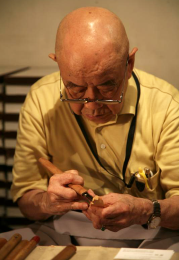
As an sculptor
Do you go out and see other sculptures and details of shrines and temples as part of your work?
Yes, I do. It is important to visit Nara and Kyoto and see old masterpieces. Actually, I often go to take a look at them.
Do you make sketches before carving sculptures?
If I do not make drawings, I cannot well understand structural outlines. I have made many drawings from the age of 8.
"Karakusa Chokoku Gakuen," or Karakusa sculpture school
When did you start the sculpture class?
I have held the class since 1960. I have taught more than 35 thousand students, including students who took correspondence lessons.
What do you bear in mind as a teacher?
There are various types of students. Some students are skillful from the beginning, but others do not made progress even if they have attended the class for 20 years. It depends on each individual's talent, so I can't help it. However, if I do not praise students who have made no progress for 20 years, they lose interest and quit the class. I think one of the teaching techniques is to encourage students with positive feedback and improve their skills. I pay attention to such points.
How many apprentices do you have?
I teach about 15 apprentices. All of them become independent as sculptors and make their livings.
Tools
Could you tell me about tools you are using?
I purchased the oldest tool when I was 8 years old, so I am using 80-year-old tool. It is the very expensive tool. In any case, I cannot do a good performance if I do not use expensive, fine tools. Also, I sharpen edges everyday.
I think that handles are also worn away. Do you replace them with new ones?
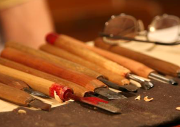
Okawa's works
What kind of sculpture are you actually making today?
I am now carving an Enku Buddhist statue. In the Edo Period, a monk called "Enku" devised a method to easily carve Buddhist statues. Using that method, I am carving this statue.
Are you commissioned to create sculptures?
The largest sculpture I have made is 2 meters high, and the smallest one is 2 centimeter high. Officials of shrines and temples as well as individuals have commissioned me to create sculptures.
You have also created works, such as carved wooden underwear, haven't you?
This work was displayed at an exhibition. I was asked to show something different other than Buddhist statues, so my wife bought new underwear at a department store, and I created the work from the underwear.
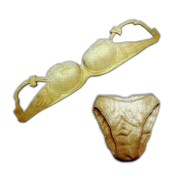

Kotaro Okawa

Carved Wooden Board with Traditional Pattern

Okawa learned carving from Koun Takamura

The notion that merits of Japanese arts should be recognized once again gained popularity in the Meiji Period, and there was a period when Tenshin Okakura advocated the preservation of traditional Japanese cultural properties. I heard that Okakura invited Koun Takamura as a professor at the Department of Sculpture, Tokyo Fine Arts School (present-day Tokyo University of the Arts), and passed down the tradition of wood carving techniques to the next generation. In my sculpture class, following Takamura's method, I first teach students to carve traditional patterns that have been taught since the days of Takamura.
I make anything that can be carved from wood

Left) Buddhist statue sculpture carved by the traditional method
Right) Jacket carved out of wood, which is full of Okawa's humor
I once carved briefs and brassiere, which were displayed in an exhibition. I was asked to show something different other than Buddhist statues. Since I carved sculptures other than traditional Buddhist statues, those sculptures temporarily gained popularity. So I make anything that can be carved from wood.






